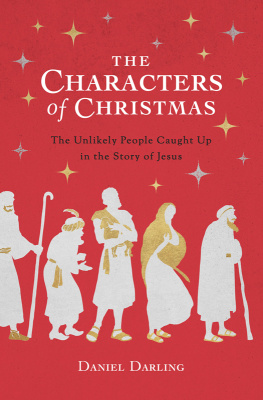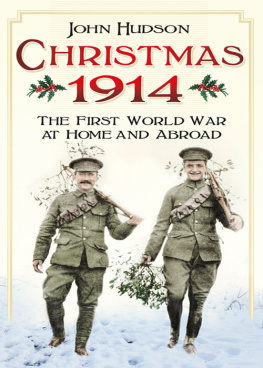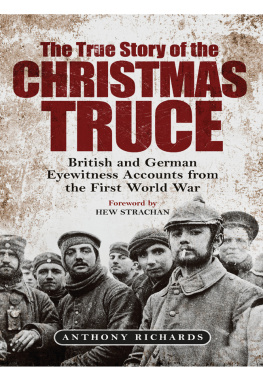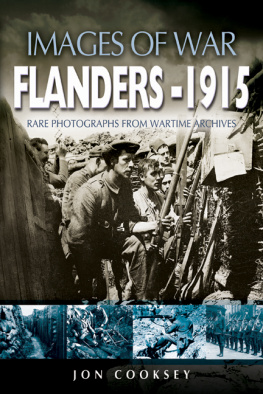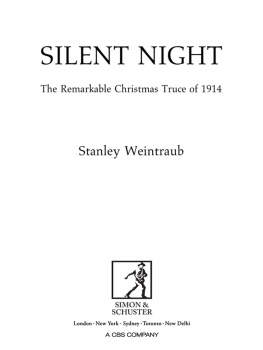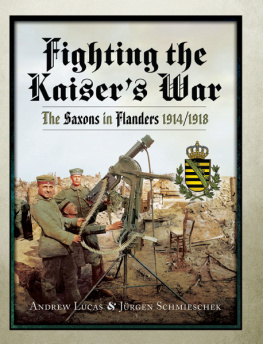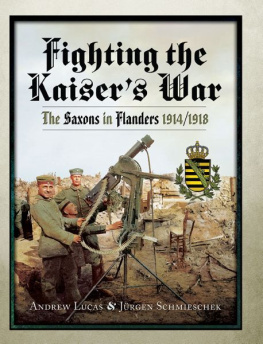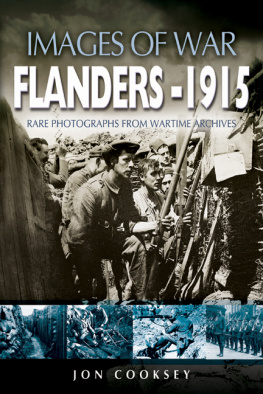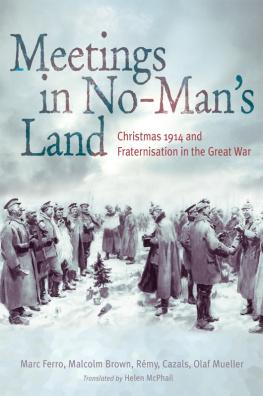Title Page
THE CHRISTMAS MATCH
Pehr Thermaenius

Publisher Information
This edition published in 2014 by
Uniform Press Ltd
66 Charlotte Street
London
W1T 4QE
www.uniformpress.co.uk
First published in Sweden by Bokfrlaget Atlantis AB 2014
Digital edition converted and distributed in 2014 by
Andrews UK Limited
www.andrewsuk.com
Text copyright 2014 Pehr Thermaenius
Original cover design and maps copyright 2014 Patrik Sundstrm
English language design copyright 2014 Tora Kelly
All rights reserved. No part of this publication may be reproduced in any form or by any means without permission of the publishers.
The Publisher has made every effort to contact the current copyright holders of the images. Any ommission is unintentional and the Publisher would be pleased to hear from any copyright holder not acknowledged.
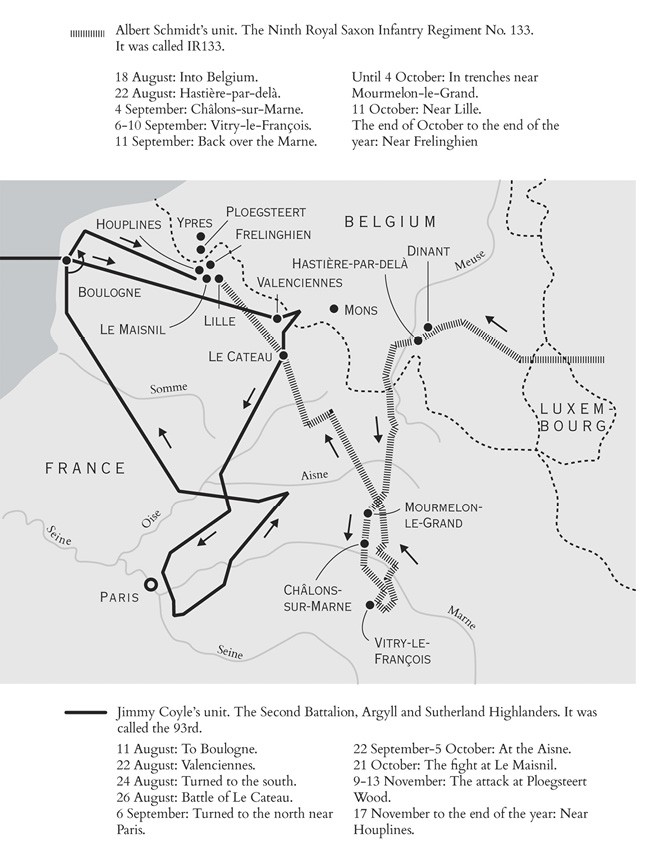
Two Footballers
Albert and Jimmy
The road to a field in Flanders
The war in Flanders between German and British soldiers fell silent on Christmas Eve 1914. The soldiers stopped shooting and started singing. On Christmas Day they came out of their trenches and met in No Mans Land. Some played football. This story is about two men, both footballers and soldiers, one Saxon and one Scot. They were in units that played a match in a field, between the French villages of Houplines and Frelinghien.
Albert Schmidt played inside right in the third team of Fussballclub 02 Schedewitz, a small town bordering the garrison town of Zwickau - in Saxony in eastern Germany. He was a conscript soldier and Gefreiter, the equivalent of lance corporal, in the 9 th Saxon Regiment, which was number 133 in the German Army. Albert was awarded the Iron Cross, Second Class, for his conduct in a fight in 1914. He was killed on 20 August 1916. His grave is in the German war cemetery in the French village of Villers-au-Flos.
Sergeant James Coyle was a professional soldier in the 2 nd Battalion of the Argyll and Sutherland Highlanders Regiment. He was captain of the battalion football team and before the war he played a few games as inside left for Albion Rovers, a professional club in the second division of the Scottish league. When war broke out his battalion was based at Fort George, near Inverness in Scotland. James, who was most probably called Jimmy, survived the war. He was awarded the Military Medal for his conduct in a fight in 1918.
It is not possible to say for sure that Albert and Jimmy played each other or that they met during the Christmas Truce. Germany and Britain damaged each others archives from the First World War when they bombed each others cities during the Second World War. The war diaries of the 133 rd Regiment and lists of soldiers are not to be found in Schsisches Staatsarchiv in Dresden. The war diaries of the Argyll and Sutherland Highlanders are in The National Archives in London, but most documents with information about individual soldiers were lost. But fortunately there is much to be learnt about these two units in surviving diaries, letters and accounts of the war. With the help of these sources I have been able to follow Albert and Jimmy through the war to that hard, frozen field in Flanders that became a football pitch on Christmas Day.
Both Albert and Jimmy were in the war from its beginning, in August 1914, and both of them must have believed it would be a short war. The German Emperor told soldiers that they would be home before the leaves had fallen from the trees. British officers and politicians thought the war would be over by Christmas. But that did not happen. The time up to Christmas came to be less than one tenth of the duration of the war.
Albert Schmidts regiment went into the war with just over 3,300 men. By Christmas the regiment had reported at least 2,141 soldiers lost: killed, wounded, missing or taken prisoner. Also, many soldiers must have left the regiment because they were ill or injured in accidents that were not caused by the enemy. About 1,800 replacement soldiers had come to the regiment in the period before Christmas.
Jimmy Coyles battalion landed in France with just over 1,000 men which was also the strength at Christmas. I have found reports of about 860 lost soldiers. But a more reliable measure of the casualties is probably the number of new soldiers who came to the battalion before Christmas: 1,134 men.
So at Christmas the German regiment had lost a number of soldiers roughly corresponding to two-thirds of the number that went into the war. The British battalion had lost more soldiers than came to France in August.
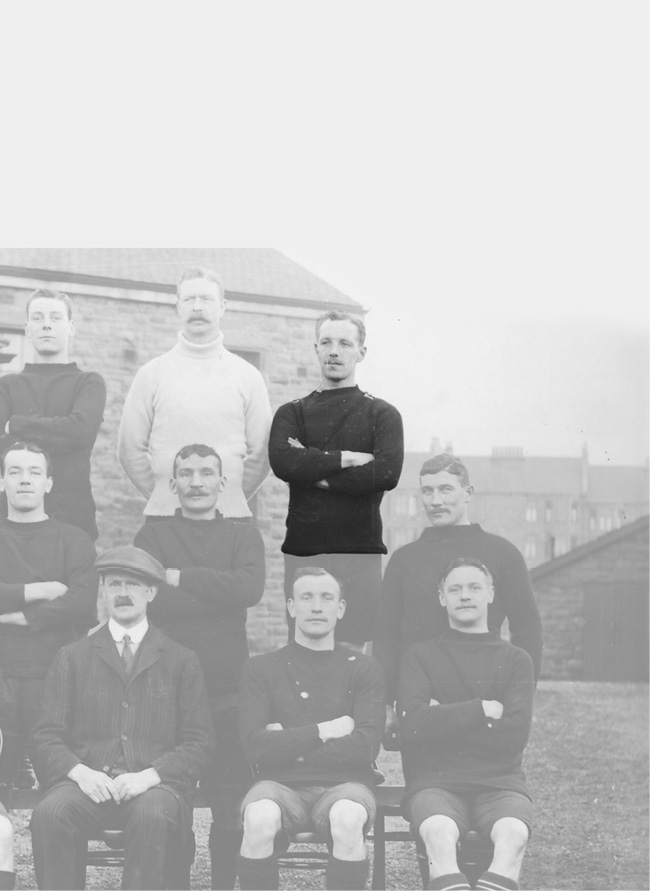
Sergeant James Coyle was a professional soldier in the second Battalion, Argyll and Sutherland Highlanders. He was also captain of the Battalion football team before and after the war.
(Argyll and Sutherland Highlanders.)
Therefore one should not look on the German regiment and the British battalion as two large groups of men who marched off and fought together during autumn and the beginning of the winter. Most of the soldiers who met between the trenches on Christmas Day did not take part in the first fighting in August. And most of those who were there in August were no longer there at Christmas.
But Albert and Jimmy were there. By Christmas they had learnt to live in muddy trenches, with lice and rats and the smell of bad latrines and decomposing human bodies. And there was also the risk of at any moment losing a friend or losing ones own life. But during an hour or so on Christmas Day these two forwards could forget the war. Other things became important, like an opening pass or, better, a good shot into the goal.
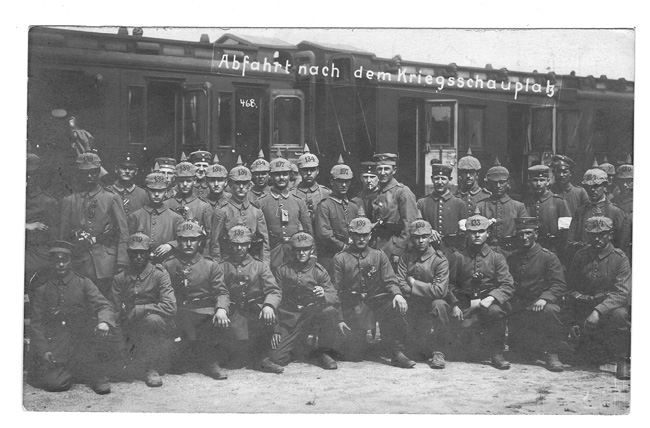
There is no picture of Lance Corporal Albert Schmidt. He was a conscripted soldier in the Ninth Royal Saxon Infantry Regiment, number 133. The picture shows other soldiers in the Regiment on his way to the war.
(Manfred Beyer)
Albert and Jimmy
Albert
The boys from Schedewitz
Fussballclub 02 Schedewitz lost 18 players when Germany mobilized on 2 August 1914. These players were members of the Clubs three teams for the 1912-1913 season in the Western Saxony league. But the names of these 18 players do not appear in the line-ups for the 1914-1915 season. It is not probable that they lost their places in the teams because they were not good enough. The clubs history, written for its 25 th anniversary in 1927, says that the club lost so many players to the army that there were only enough players left for one team. If any of the 18 players had been free to play there would surely have been a place for them in a team.
The city of Zwickau, of which Schedewitz was a working-class suburb, had 75,000 inhabitants in 1912. It was a centre for industry, trade, education, culture and administration in Saxony. Zwickau was also a military town. Its most prestigious regiment was the Ninth Royal Saxon Infantry Regiment No. 133. It was usually called IR133.
The coal mines dominated the Zwickau economy. A panorama of the coal fields drawn in 1857, shows 39 chimneys, and 28 mines are listed in the caption. Later in the century more and deeper mines were built. The owners of the mines, at first called coal farmers, formed large corporations and became coal barons.
Next page

